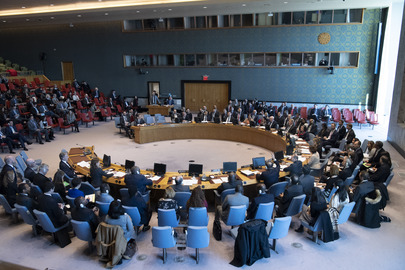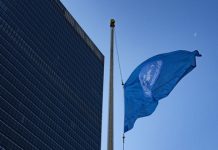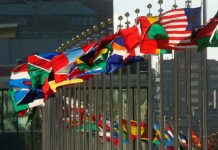In Gaza, hospitals are ‘at near-total collapse’ and staff are overwhelmed
Exhausted UN aid workers in Gaza on Thursday continued to report a lack of food across the enclave, while medical teams warned that hospitals are overwhelmed by a daily influx of injured people – and close to “near-total collapse”.
Meanwhile, UN agencies confirmed the deaths of three Palestinians from Guillain-Barré Syndrome, a rare auto-immune disease that can cause sudden muscle weakness and paralysis.
Before war erupted in Gaza in October 2023, only a handful of cases of the syndrome surfaced every year.
“Hospitals are overwhelmed by mass casualty incidents”, with an average of eight per day, said the UN aid coordination agency, OCHA.
It noted that specialised rehabilitation facilities were also overstretched, having to handle complex trauma injuries as well as cases of Guillain-Barré.
To date, there have been three deaths linked to the syndrome, out of around 64 cases confirmed by the health authorities in Gaza.
Two of the deceased were children.
DR Congo: UN human rights chief condemns surge in M23 violence
To the Democratic Republic of the Congo, DRC, where UN human rights chief Volker Türk has condemned the escalation in deadly violence targeting civilians.
The High Commissioner for Human Rights highlighted escalating attacks by the Rwanda-backed M23 rebels and other armed groups in the east of the country over the past month.
Citing first-hand accounts, the UN human rights office said that at least 319 civilians were killed between 9 and 21 July by M23 militia, allegedly backed by soldiers from Rwanda’s national army.
The killings happened in four villages in Rutshuru territory in North Kivu province.
With more, here’s UN human rights office spokesperson Jeremy Laurence:
“This is one of the largest documented death tolls in such attacks since the M23’s resurgence in 2022; most of the victims, including at least 48 women and 19 children, were local farmers camping in their fields during the planting season.”
Last month, multiple similar attacks took place in North Kivu, South Kivu and Ituri provinces.
Mistreatment remains common in maternal and newborn care, says WHO
Health news now, and the UN World Health Organization – or WHO – has said there’s evidence suggesting that women are commonly abused when giving birth in maternal and newborn care settings.
Across four countries, researchers found that more than four in 10 women were physically or verbally abused during childbirth and some also experienced discrimination.
In addition, up to 75 per cent of extremely sensitive procedures were done without consent.
In response to the problem, the UN health agency has released a guide to promote respectful, dignified care and eliminate mistreatment across maternal and newborn health services.
“Too often, women are not part of decision-making and are treated with contempt or even abuse,” said WHO’s Dr. Hedieh Mehrtash. She added that respectful care is not a luxury but rather a fundamental human right that shapes health outcomes.
WHO’s “Compendium on respectful maternal and newborn care” highlights critical areas where mistreatment is often overlooked.
These include the mental health of the mother shortly before and after giving birth and support for bereaved families, or for parents caring for small and sick newborns.
Daniel Johnson, UN News.
Source of original article: United Nations (news.un.org). Photo credit: UN. The content of this article does not necessarily reflect the views or opinion of Global Diaspora News (www.globaldiasporanews.com).
To submit your press release: (https://www.globaldiasporanews.com/pr).
To advertise on Global Diaspora News: (www.globaldiasporanews.com/ads).
Sign up to Global Diaspora News newsletter (https://www.globaldiasporanews.com/newsletter/) to start receiving updates and opportunities directly in your email inbox for free.


























